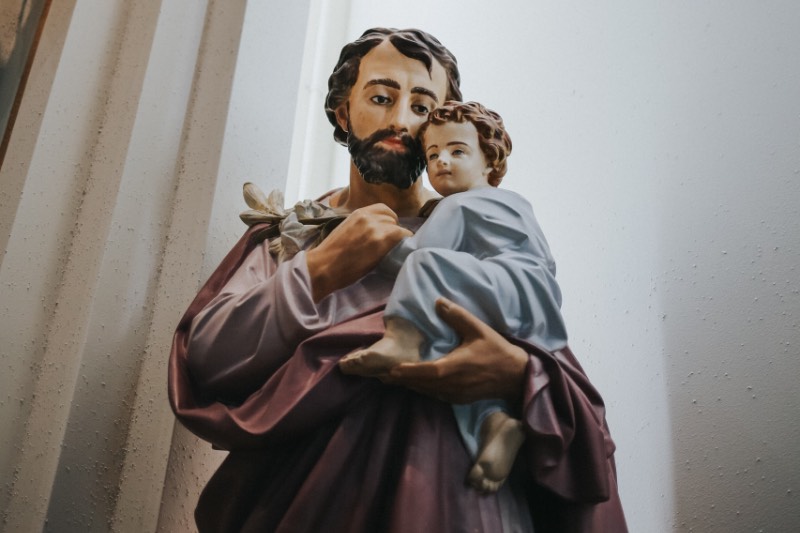There are many gems and reflections on ‘fathering’ in Pope Francis’s apostolic letter, Patris Corde ‘With a Father’s Heart’, in which he nominates 2021 as the year to honour the fatherhood of St Joseph. Francis’s letter is inclusive, encompassing the scope of fatherhood and the responsibilities fathering entails. ‘Fathers are not born, but made’, Francis says. ‘A man does not become a father simply by bringing a child into the world, but by taking up the responsibility to care for that child’.

Positive and engaged fathers who value women and treat everyone with respect are needed today more than ever. To quote Francis, ‘In our world where psychological, verbal and physical violence towards women is so evident, Joseph appears as the figure of a respectful and sensitive man’, ‘creatively courageous’, who models a ‘freedom from possessiveness’.
I’m sure many of us would love to see Saint Joseph, and the qualities he represents, as an exemplar for fatherhood. However, despite all the worldwide churches, institutes, schools and religious orders dedicated to Joseph, he has always seemed to be in the background, never centre stage.
Francis laments the failures of fathering for many children across the globe. ‘Our world today needs fathers’. While the response to the Pope’s letter has been largely devotional, his letter deserves wider reflection on how our society is responding to the challenges of fatherhood in 2021.
There are many signs that fatherhood in Australia is changing for the better. There is now abundant evidence that dads are spending more time at home with their kids. The advent of father support blogs regularly featuring famous dads and websites like ‘Stayin on Track’ with resources for Aboriginal dads by Aboriginal men, and new ‘father friendly’ education websites, all herald the big cultural shift that is taking place.
Particularly hopeful is the growing acknowledgement that the interests of mothers, fathers and children can be aligned in ways that work for everyone. A great example of this is the campaign for gender equality, with parental leave widely regarded as beneficial all round, lifting women’s capacity to return to work, bonding fathers and children and enabling savings on child care.
'Like Saint Joseph, "the man who goes unnoticed" as Francis calls him, there are countless dads in all types of families who are transforming fatherhood.'
There are signs, too, that reflect a new understanding of the importance of fathering across the community services sector. This is the sector that grapples with family violence, the safety of children, youth homelessness and youth crime on a day-to-day basis — where the need for caring and responsible fathers is most apparent. Where ‘working with parents’ seldom means working with fathers.
I often sense that there is no easy way for the community sector to talk about fathers. There is a wariness about venturing into areas that are seen as fraught with complexities — where there is no common understanding of what a ‘home’ constitutes and no universal appreciation of the importance of nurturing and compassionate fathering.
The community sector acknowledges that it is largely reactive and crisis driven in its response to social problems like homelessness and family violence. Agencies chiefly depend on government resources to do earlier work with fathers — resources that are largely locked into remedial programs. Early intervention with fathers is still a long way off for many organisations.
And while there has been a surge in research on fathering in recent times, this has not yet been translated into effective policy. There is a glaring absence of policies and action (at all levels of governance) aimed at supporting fathers with their roles and responsibilities. For instance, it is rare to find policies that speak to the importance of fathers in raising boys to respect mothers and women.
Yet there is a growing realisation within the community sector, informed by new research, that approaches aimed at supporting fathers can provide lasting benefits for mothers, children and families.
The sector’s report The Voice of Parents with Melbourne University shows that missed opportunities to engage fathers can unfairly leave the burden of responsibility solely on women and miss precious opportunities to benefit children.
Agencies like Anglicare, Uniting Care and Kids First are taking up the challenge with their Caring Dads programs, tailored for fathers, who are changing their behaviour for the sake of their children. And Relationships Australia’s Support For Fathers has developed new tools to help agencies in their work with families.
Despite the daunting challenges, there is much to be hopeful about. Like Saint Joseph, ‘the man who goes unnoticed’ as Francis calls him, there are countless dads in all types of families who are transforming fatherhood — working from home, sharing the ups and downs of parenthood with their partners, raising their kids to respect all others, and like Joseph are ‘creatively courageous’ in tackling the challenges of our time.
 Mike Kelly is a Geelong social worker with a special interest in fatherhood and early intervention with vulnerable families.
Mike Kelly is a Geelong social worker with a special interest in fatherhood and early intervention with vulnerable families.
Main image: Statue of St Joseph and Jesus (Anna Hecker/Unsplash)